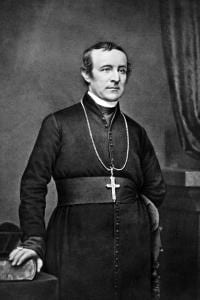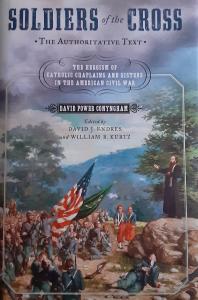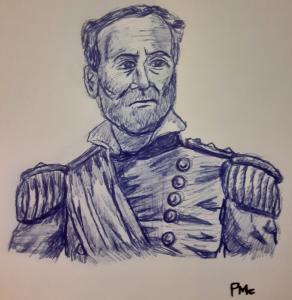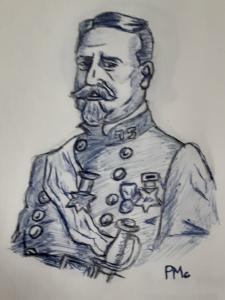![Armstrong-Gen.-Frank-C.-31599[1]](https://wp-media.patheos.com/blogs/sites/224/2013/11/Armstrong-Gen.-Frank-C.-315991-231x300.jpg) The College of the Holy Cross was founded in 1843 by Father Benedict Joseph Fenwick, a Jesuit who later became second Bishop of Boston. New England’s first Catholic college, its early students Irish immigrants like General Patrick Guiney, who fought for the North in the Civil War, as well as the Healy brothers Patrick, James and Alexander, the country’s first African-American priests. Southerners and Northerners attended the college side by side, and later fought against each other in the Civil War. Frank Armstrong, who attended Holy Cross in its early years (and was a relative of Bishop Fenwick), later served as a general in the Confederate Army. The attached article appeared in one of the college’s early yearbooks:
The College of the Holy Cross was founded in 1843 by Father Benedict Joseph Fenwick, a Jesuit who later became second Bishop of Boston. New England’s first Catholic college, its early students Irish immigrants like General Patrick Guiney, who fought for the North in the Civil War, as well as the Healy brothers Patrick, James and Alexander, the country’s first African-American priests. Southerners and Northerners attended the college side by side, and later fought against each other in the Civil War. Frank Armstrong, who attended Holy Cross in its early years (and was a relative of Bishop Fenwick), later served as a general in the Confederate Army. The attached article appeared in one of the college’s early yearbooks:
HOLY CROSS STUDENTS IN THE CIVIL WAR: General Armstrong,” The Holy Cross Purple, Volume 3, No. 1 (June 1896): 20-23.
Gen. Frank C. Armstrong is the son of Major Frank W. Armstrong of Tennessee, who served under Gen. Andrew Jackson, and was his personal friend. His mother, Anne M. Millard, came of an old Catholic family of Maryland, connected with the Fenwicks and Mannings. Frank C. Armstrong entered Holy Cross College in 1845. In 1854, he went to Texas, and in company with his step-father, Gen. Persifor F. Smith, U.S.A., he made a trip across the state from Corpus Christi to El Paso. It was during this year that he was recommended for an appointment in the army for the bravery he displayed in an encounter with the Indians in Texas.
In June, 1855, he was appointed Lieutenant in the 2nd U.S. Dragoons serving in Texas, Kansas, and Nebraska, until 1857, when he went with his regiment to Utah in the expedition under Gen. Albert Sydney Johnston. In 1861, he resigned his commission and joined the Confederate Army. It would require far more space than we have at our disposal to give a detailed account of the prominent part taken by Gen. Armstrong in the Civil War.
Throughout the entire war records, we find his name mentioned in terms of the highest praise. In the beginning of the war, when serving as volunteer aide-de-camp, we read how he went gallantly into the fight, and bore himself with great courage and coolness. His conduct, say the records, is ever active and soldierly, a meritorious officer whose value is lost to the service by his not receiving rank more accordant with his worth and experience. This was in March 1862.
The same year and month, Gen. Van Dorn writes, requesting that the President be pleased to confer the rank of Lieutenant Colonel on F.C. Armstrong. Nor was his promotion long deferred. After reporting to the War Department, in Richmond, Va., he joined Gen. McCulloch, commanding the Confederate forces in Arkansas, and was assigned to duty as adjutant general in his division. After the death of McCulloch, Armstrong was appointed Major, and in the reorganization at Corinth, he was elected Colonel of the 3rd Louisiana Infantry. He was soon detached from this regiment, and assigned by Gen. Bragg to organize a cavalry command.
Gen. Armstrong was now engaged in Northern Mississippi and Alabama. He attacked and captured the Federal Camp at Courtland, Ala. Having left Baldwyn at the head of 1,100 men, he was reinforced at Holly Spring by about 1,100 cavalry, pushed boldly forward toward Bolivar, met a largely superior force in front of that town, and drove them back with heavy loss, killing and wounding a large number, and capturing seventy-three prisoners. When this was accomplished, he did not delay, but pushed northward, crossed the Hatchie River, passed between Jackson and Bolivar, at which places there were heavy bodies of Federal troops, and took and held possession of the railroad for more than thirty hours, during which time he destroyed all the bridges and a mile of trestle work.
On his return, he encountered the enemy in force near Denmark, attacked and routed them, killing and wounding about seventy-five, capturing 213 prisoners and taking two pieces of artillery. The highest praise was awarded to Gen. Armstrong, for the prudence, discretion, and good sense with which he conducted this expedition. His gallant conduct was made the subject of a special despatch to the government. He was soon appointed Brigadier General, and assigned to a brigade under Van Dorn.
Later he was assigned to Forrest’s division, and commanded a brigade during the campaign in Tennessee and on the retreat to Chattanooga. In the retreat at Corinth, he proved the salvation of the retreating forces by rebuilding, with great foresight and energy, the bridge the Northern forces had burned. He served with Forrest until after the battle of Chickamauga. In the official records of this battle, special praise is given to Armstrong’s brigade, for his command was dismounted and fought almost entirely on foot, always up, and frequently in advance of, the infantry. The charges made by Armstrong’s division while fighting on foot in the battle of Chickamauga would be creditable, according to the official report, to the best drilled infantry.
After Chickamauga, he moved with Longstreet to East Tennessee, under Gen. Joe Wheeler. An inspection of the latter’s papers shows Armstrong singled out for praise for gallant and good conduct. He was engaged in no battle in which his bravery did not make him prominent, even among prominent officers. When Longstreet fell back to Virginia, Armstrong moved to Virginia, serving there until the fall of Atlanta. His coolness and foresight, his energy and determination, did not desert him during these trying days. He went with Hood’s army to Tennessee, and assisted in covering Hood’s retreat, from Franklin to the Tennessee River. His was the last Confederate brigade to cross the Pontoon bridge to the south side of the Tennessee River.
Hood knew well the bravery of his faithful follower, for he had already recommended him to Beauregard as the best man in his army for the post of Major General. Armstrong now operated in Mississippi with Forrest, but on the surrender of Generals Lee and Johnston, Forrest’s command was surrendered by Gen. Taylor to Gen. Canby.
For several years after the war, Gen. Armstrong was engaged in overland mail service in Texas, Kansas, and Indian Territory. During Mr. Cleveland’s first administration, he was made United States Indian Inspector, served for four years, and was removed by President Harrison. Under the present administration, he was appointed Assistant Commissioner of Indian Affairs, but resigned on January 1, 1895. The Secretary of the Interior expressed his regret at Gen. Armstrong’s resignation, for he was generally conceded to be the best informed man on Indian matters in the public service, and the department could not but feel his loss keenly. Gen. Armstrong is now a member of the Commission authorized by Congress to treat with the Five Civilized Tribes in the Indian Territory.











